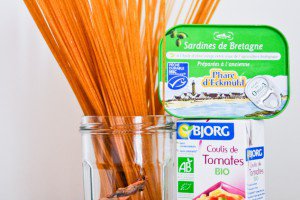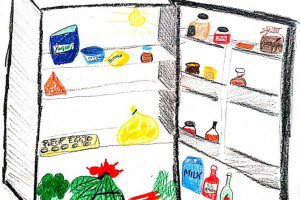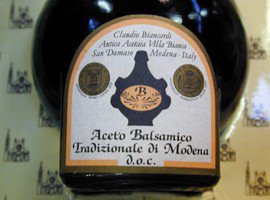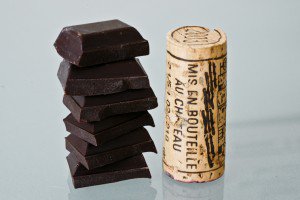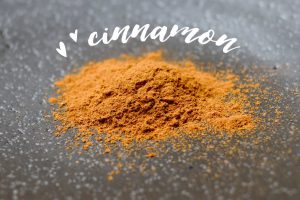
For this new installment of our Draw Me A Fridge series (read about it here), Alexia met with Professor Hervé This.
Hervé This (pronounced “tiss”) is an internationally renowned physico-chemist, a professor at the AgroParisTech institute, and the only person to hold a doctorate in molecular gastronomy, a cutting-edge field he co-created with Nichola Kurti. (See also: Notes from the moleculat gastronomy conference.)
A long-time accomplice to famed French chef Pierre Gagnaire, a popular French television personality, and a bestselling cookbook author, he uses the latest research in the chemistry, physics, and biology of food to challenge traditional ideas about cooking and eating.
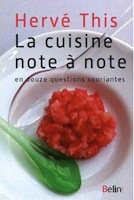 Amongst his many projects, he has been commissioned by the Ministry of Education to create cooking workshops in French primary schools, and he is tirelessly determined to reinvent the way we cook. At the time of our meeting, Professor This was on his way to Canada to introduce his concept of “note by note cooking” or, in his own words, “the world’s next culinary trend” (more information on his blog). His latest, just-released book is called La Cuisine note à note en douze questions souriantes.
Amongst his many projects, he has been commissioned by the Ministry of Education to create cooking workshops in French primary schools, and he is tirelessly determined to reinvent the way we cook. At the time of our meeting, Professor This was on his way to Canada to introduce his concept of “note by note cooking” or, in his own words, “the world’s next culinary trend” (more information on his blog). His latest, just-released book is called La Cuisine note à note en douze questions souriantes.
AC: What are your fridge staples?
HT: My wife laughs about the fact that there is always a piece of smoked lard to be found in the fridge, even though the lard is smoked and salted precisely so that it can be kept outside of a fridge!
My fridge is actually really, really, packed. On the top shelf, I keep all sorts of homemade preparations such as chutneys (that could be kept outside the fridge as well), harissa, ketchup, and ginger preserves.
The freezer is also very crowded. In it you’ll find meat filling for pâté vosgien* since I always make too much of it. You will also find small containers of stock from pork trotters Sainte-Ménehould [an age-old specialty made of pork trotters that have been bound and slow-cooked in white wine, with herbs and spices] that has cooked for over four days. The result is a stock so tasty that just a teaspoonful is enough to bring flavor to any dish.
AC: That sounds good.
HT: You bet. I make a mean pork trotters Sainte-Ménehould! Oh, you will also find a bottle of vodka.
But back to the fridge… I keep dried tomatoes in oil (baked at 95 degrees Celsius and preserved in olive oil with lemon juice, salt, sugar, thyme, and rosemary); lemons preserved in salt; homemade pissalat [a condiment from Nice made with puréed anchovies, flavored with cloves, thyme, bay leaf and black pepper, and mixed with olive oil] of which I made three kilos — I should have enough for years since I only use a tiny bit at a time.
In the door of the fridge, I keep poutargue [a.k.a. bottarga, a sort of fish spawn pickle preserved in salt, also known as the “Mediterranean caviar”], capers, unsalted butter and salted butter, fat from foie gras, and a garlic saucisson.
You will also find foie gras that was cooked in the dishwasher (in a Ziploc bag closed with paper clips with a mix of white wine, port, salt and pepper). Obviously, we also have eggs, and yogurts for the whole family.
Right now, you will also find two small terrines, one with a beautiful bread dough that I had to retard because it was proofing too quickly, and the other one for an Arabic-style bread. There is also a shrimp curry — for tomorrow probably –, shrimp bisque after a typical regional recipe from Charentes, and an asparagus and watercress soup.
You would also find Laughing Cow cheese wedges, because they melt well and are quite handy to have. Also, some crottins de Chavignol [a goat cheese produced in the north-west part of the Sancerre wine region] that have been in there for ages.
And I always keep fruits and veggies on the countertop.
AC: Do you handle the grocery shopping yourself?
HT: When you’re in charge of the cooking, you’re the one who knows what’s needed, so yes, I do the shopping. I don’t have the time to go to small specialty shops, unfortunately. I usually go to my village’s supermarket, though it saddens me to do so. But you know, I buy worthless products and give them flavor and taste through the preparation and the cooking.
For the dried tomatoes, I buy terrible tomatoes and make them delicious by preparing them properly. Tomatoes are dirt cheap in the summertime, so I stock up and make preserves and chutneys for the wintertime. Same thing with smoked salmon — I buy farm-raised salmon at 6 euros a kilo, and turn it into a succulent dish that will make my guests ask for seconds. And I have some pretty famous chefs that come over for dinner at my house!
Products that we find in supermarkets nowadays are all very good quality. When people complain that their tomatoes are tasteless, it’s because they’re silly enough to buy them in the wintertime. Even so, they can just give them taste by cooking them well. In France, the only thing I can’t quite get right is salmon trout (a.k.a. brook trout): no matter how I prepare it, it always ends up tasting like sludge. It might just be that I am missing something.
AC: What is the most surprising thing that you keep in your fridge at home – or the most surprising thing about your fridge?
HT: Besides the shoes that have found their way to the fridge that one time? I once decided to test the theory according to which the perfect consistency for mayonnaise is achieved by adding a spoonful of boiling hot vinegar. Well, I ended up getting yelled at by my family for 39 days! I had put a few bowls of mayonnaise in the fridge: one prepared with a spoonful of cold water, one with a spoonful of hot water, one with a spoonful of cold vinegar, and one with hot vinegar. The plan was to observe them with a microscope, compare their behavior, photograph them, and see which one would go first. My doctor of a wife was furious with me, saying I was going to contaminate everybody with my experimentation! Well, after 39 days, all preparations were identical, with just the faintest layer of oil at the top — it was a really well made mayonnaise. Anyway, the kitchen is my space. Whenever they want to organize it, I bark at them!
AC: Any “science experiment” or cooking disaster that you would like to share?
HT: My sons tell me that my food is often burnt, which is probably true. I don’t think I find cooking to be that much fun, actually. What I like about it is the chemistry bit. So when I’m back at my desk, I forget what’s cooking!
AC: Herve This’ sons complain about their dad’s cooking? How ungrateful!
HT: Yes, but my sons are exceptional cooks! Years ago, we had to leave the youngest one alone at home because of a teachers’ strike when he was just six years old. We were a bit worried — it was the first time he was on his own for such a long period of time. Great kid. A complete Mad Hatter, too.
I come back in the evening earlier than usual, a little worried. The house hasn’t burnt down, so that’s good. Everything seems fine. I ask him what he ate. He says, “a cheese soufflé.” Six years old! “I took the big book,” he tells me (the Larousse Gastronomique) and opens it at the page of the recipe. “Was it good?” “Well, it was a bit heavy.” I take a look at the recipe: twelve eggs, etc. He had eaten a soufflé for six by himself!
But you know, when he was in his recliner as a baby, I would put him on the countertop [Note from Clotilde: nowadays you’re told not to do this], so the kitchen has no secrets for him. But what’s really important is this: no gas in the kitchen. (It’s 80% wasted energy anyway. Induction is a much better choice.) And the other day, my older son, who’s currently in Denmark, sent me pictures of baguettes he had just baked.
AC: Do you keep anything non-edible in there?
HT: Only my wife’s vaccines. Nothing else. That’s the one and only exception. Anything else is forbidden.
AC: Any recipe you could suggest to our readers for when there’s hardly anything left in the fridge?
HT: That’s not really a problem I tend to have! We often have three pots in the oven slow-cooking during the day, so there is always something to eat in the house. But if that wasn’t the case, I guess I would take the puff pastry dough in our fridge, the leftover preparation for pâté vosgien in the freezer, and voilà! Pâté vosgien!
* Hervé This’ recipe for this traditional meat pie comes from his grand-mother: marinate pieces of veal and pork for 48 hours in white wine with onions, shallots, garlic, salt, pepper and four-spice. Cover the bottom of a pie dish with puff pastry, add the meat preparation, wrap the dough over it, seal it and put it in the oven to bake.


